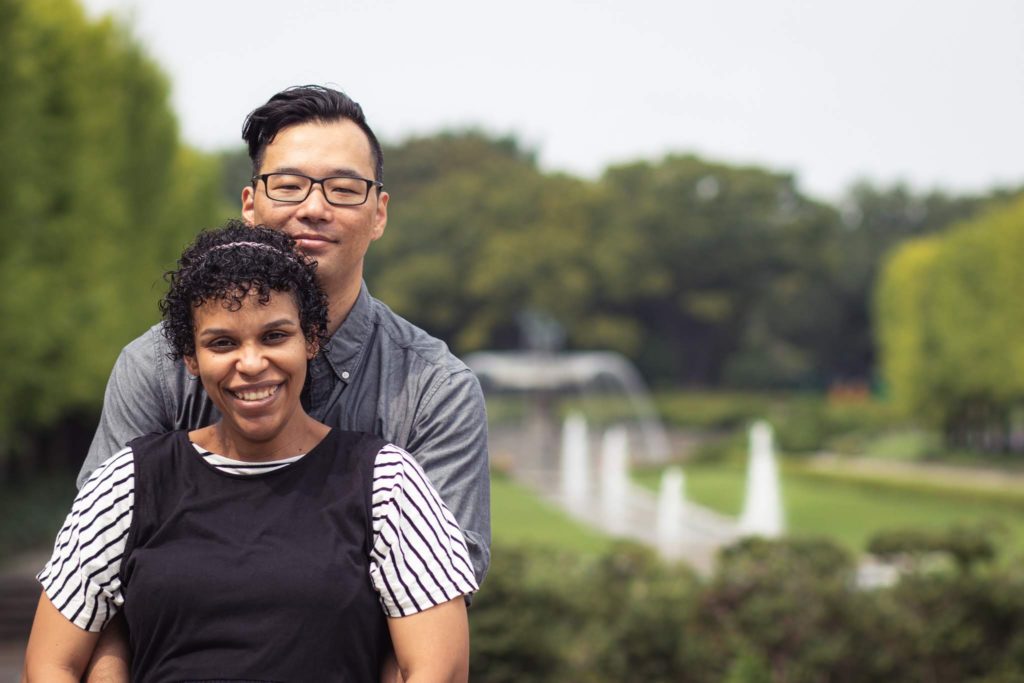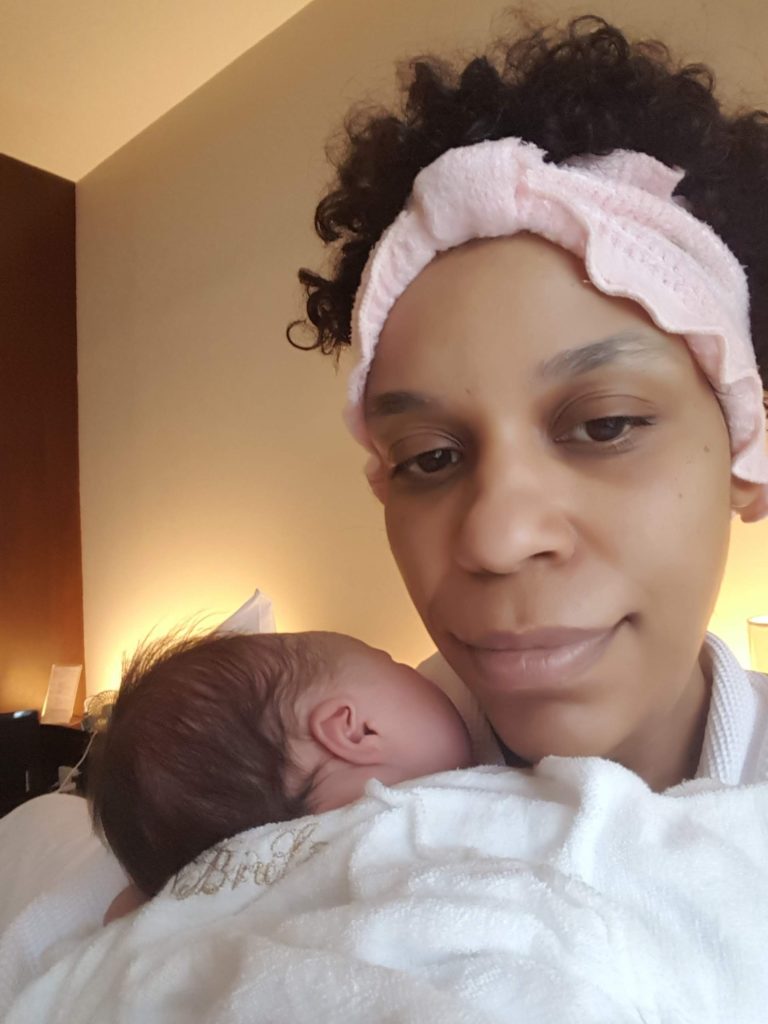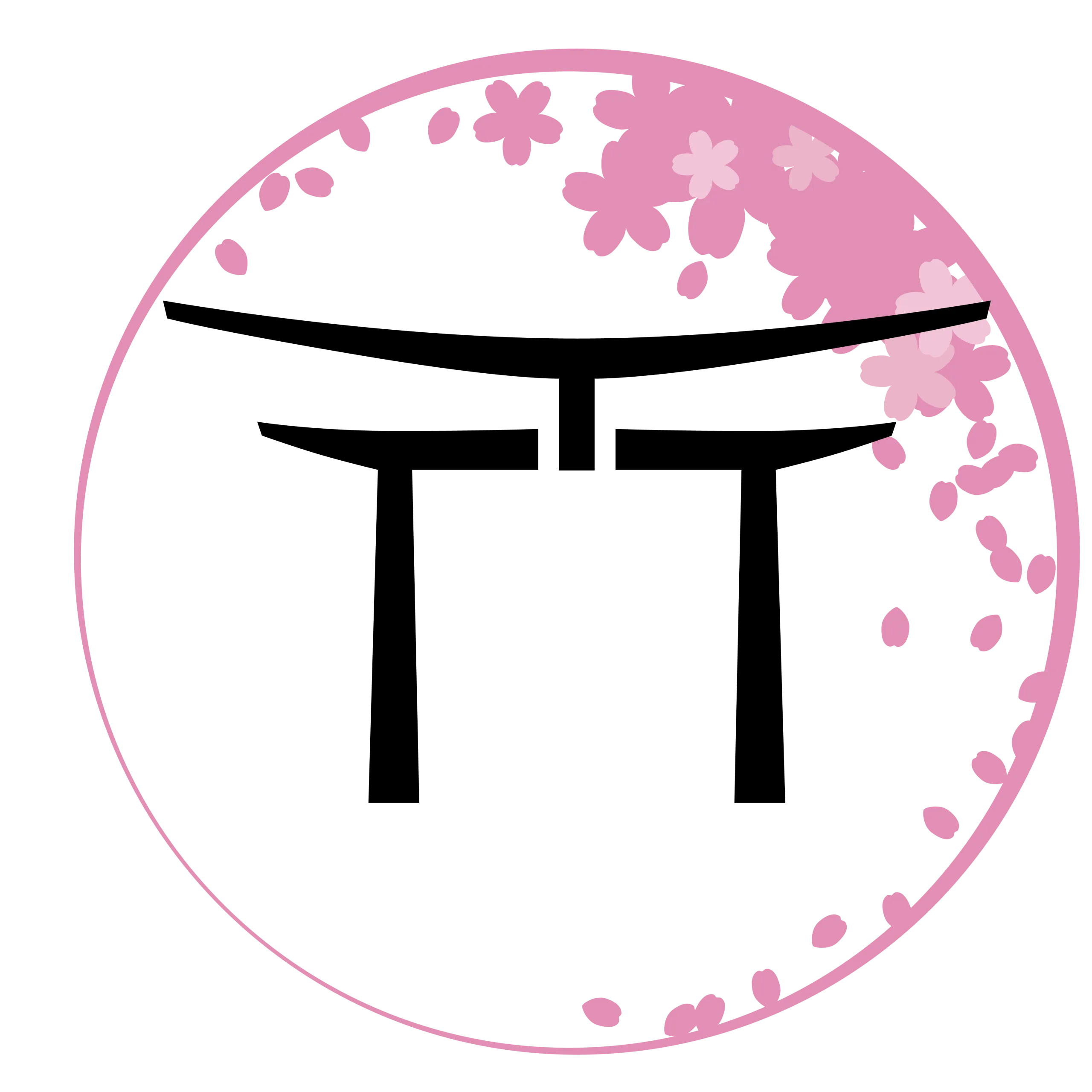Pregnancy and Motherhood in Japan: LaShawn’s Story (USA → Tokyo)

Last Updated on July 1, 2021 by Kay
This post may contain affiliate links, meaning I may earn a small commission on any purchases through those links at zero additional cost to you. Whatever I make goes to keeping this website running and I am forever grateful for the support. See my Privacy Policy for more information.
I’m very excited to announce a new series on my blog looking at the experiences of women who have given birth and are raising children in Japan.
The first in this series kicks off with an interview featuring LaShawn, a University lecturer, blogger, and now mother of a baby girl who was born in September this year in Tokyo.
Originally from a small town in Maryland, USA, LaShawn left in April 2011 to go teach English in Shanghai, China. After only a few days, she realized it wasn’t for her and began applying for jobs in Japan. There were many openings available at that time because so many teachers fled the country after the Great Tohoku Earthquake. Following a quick Skype interview, she was asked how soon she could come to Japan. After a grand total of two weeks in Shanghai, she boarded a plane and started her life here in Japan.
She spent a year working as an Assistant Language Teacher (ALT) in three schools in Tochigi prefecture. She loved the scenery of the countryside, but it was a bit lonely and dating was nearly impossible. So, she applied for a teaching position at an eikaiwa at the end of her contract and moved to Yokohama when she got the job. That is where she spent the next 7 years and started her blog, The Yokohama Life. It’s also where she met her partner.
LaShawn is now starting a new chapter of her life as a mother and was kind enough to share her experiences navigating pregnancy, childbirth, and child-rearing in Japan.
Table of Contents
Pregnancy in Japan

How did you find out you were pregnant and what did you do afterwards?
This may sound strange, but I started to feel pregnant before I actually found out for sure that I was. It just felt like something was off and different about my body. My period was almost never late, so I knew that I had to be pregnant after I didn’t get it on the first day that it was due. Japanese pregnancy tests say to wait 7 days though, so I waited impatiently before using a digital Clear Blue test.
I took the test and sat at the kitchen table with my husband (then fiancé) while waiting for the result. We flipped it over when the time was up, and the screen said “Pregnant”. I was in shock and immediately started crying. I wish I could say they were tears of joy, but I suffered from extreme anxiety. My husband held me in his arms and reassured me that everything would be okay. He was really excited about the pregnancy.
A couple weeks later I went to my English-speaking doctor to get a blood test done to confirm the pregnancy. He emailed me the results the following day, and I took them to the ward office to receive my maternity package.
What, if anything, worried you the most about the prospect of giving birth in Japan?
I worried a bit about the language barrier, and the lack of pain relief at most hospitals. I also worried about not having my family here with me. It would have been nice to have my mom and sisters here with me to turn to for comfort and support throughout the pregnancy. I think that would’ve alleviated a lot of my anxiety. It felt like I went through most of the pregnancy alone without anyone to talk to except my husband.
Which clinic or hospital did you go to and how was your overall experience?
I went to Akaeda Clinic in Tokyo. It was recommended to us by one of my husband’s coworkers. I knew that I wanted a hospital or clinic that offered an epidural, so we decided to go there for a visit. The doctor was extremely friendly and really took the time to answer our questions. What really sold me though was their 4D ultrasounds. Each time we visited we could see the baby, and had access to a free downloadable video of her scan. It was really nice being able to share the videos with my family in the US so they could see and watch her grow with us.
Overall my experience with the hospital was very positive. The nurses and staff were very kind and attentive. I felt well taken care of during and after my pregnancy.
Did you have a birth plan?
I’m ashamed to admit that I didn’t put much thought into my birthing plan. I just knew that I wanted to do skin-to-skin once the baby was born, so that was the only special request that I wrote. The clinic gave several options though. You could choose how bright or dim you wanted the lights. There was also a big TV screen over the delivery bed that could play your favorite movie, TV show, or music. I had a feeling that I wouldn’t be able to focus on it though, so I told them they could play whatever they wanted. I ended up giving birth to scenes of dolphins swimming in the ocean and music that sounded like Enya’s “Sail Away”. Perhaps I should’ve put more thought into it…
Did you take any prenatal vitamins?
One thing that really surprised me was that the first doctor I visited to confirm my pregnancy told me that prenatal vitamins weren’t necessary. This was contrary to what we’re told in the US. Regardless, I decided to take a multivitamin and folic acid in the beginning. My morning sickness got so bad during the first trimester that I could barely function. So, I did some research online and started taking vitamin B6. The results weren’t immediate, but I noticed a huge improvement about a week or so later.
The morning sickness subsided once I reached the second trimester, and for a while my body felt fine. Towards the end of the second trimester, however, I started experiencing really horrible leg cramps at night while trying to sleep. It felt like my muscles completely locked in place. So, once again I did a bit of research and found out that it was a sign that I needed more magnesium. I started taking some magnesium and calcium vitamins, and the leg cramping stopped after a few nights.
I didn’t have any other bad symptoms after that, but added DHA supplements at the start of my third trimester. It’s said to be really beneficial for the brain development of the baby.
Did you do any additional prenatal testing?
As I mentioned, I was lucky enough to find a clinic that did 4D ultrasounds at every visit. However, I was upset to find out that genetic testing wasn’t included in any of the bloodwork done during the first trimester. I was even more upset to learn that it would cost additional money to have it performed and it is extremely expensive in Japan. Only a select number of hospitals in Japan are allowed to do it by law. This has resulted in some clinics offering “illegal” genetic testing for exorbitant fees. Not knowing whether my baby had any genetic abnormalities until she was born contributed heavily to my anxiety.
Did you continue to work throughout your pregnancy? How did your coworkers take the news? Were there any challenges?
At the beginning of the year I applied for a teaching position at a nearby university. I wasn’t pregnant at the time, and was still employed at the same eikaiwa for the past 7 years. I had an interview and did a teaching demonstration for the university, and was immediately given an offer as a full-time lecturer. I was ecstatic, and they gave me a few weeks to accept or decline their offer. That was when I found out I was pregnant, and it made what would’ve been an easy decision very hard.
My husband and I had moved into a home together in Tokyo, and this made my commute very long. Originally I was planning to transfer to a different school within the same company to a location was closer. However, they couldn’t give me an exact timeline for when that would be possible. The commute took up to 4 hours a day, which became impossible for me to maintain once the morning sickness kicked in.
On top of that, I started to worry about the children that I was teaching, and how it was an unsafe environment for someone who was pregnant. I’ve been punched, kicked, pushed, and have had things thrown at me by children during my time there over the years. All of it was done playfully, but still hurt. I soon found myself fearful of teaching young children, and talking with the managers wouldn’t have solved all the issues. There was also the problem with mold and dust everywhere, and students coming to the school with influenza and other illnesses frequently.
So, the easy decision would be to quit and accept the university offer. It was what I was planning to do, but once I found out that I was pregnant, I had to think about maternity leave and childcare leave. All pregnant women are eligible to take maternity leave in Japan, but only women that have been working for the same company for at least one year and has been enrolled in the shakai hoken (social health insurance) can take childcare leave which lasts up to 1 year.
Quitting my eikaiwa job meant safer working conditions, but required me to sacrifice receiving 60% of my salary through the childcare leave. I decided to prioritize my health and the health of my baby, and accepted the university’s offer. I turned in my resignation at the eikaiwa, and never informed them that I was pregnant.
I spoke with my manager at the university after completing the training and told her that I was pregnant. Her reaction was very positive and supportive. Her and a higher manager confirmed that I would be eligible for maternity leave, but not childcare leave, because I hadn’t been employed with them for long enough. They were sympathetic to my situation though, and tried to help as much as they could.
Most of the university students and teachers didn’t realize I was pregnant until I neared my third trimester. They just assumed that I was gaining weight from all of the cookies and Snickers I was eating. Eventually I announced my pregnancy to the other teachers while sitting casually in the office. Overall the reception was very positive.
Some offered to help me to carry my teaching materials to the classrooms because they were extremely heavy. My manager also asked the university to relocate one of my classes, because it was on the third floor of an old building that didn’t have an elevator. Another teacher also brought me an ice cream cake from Baskin Robbins to say congratulations. I really appreciated all of these acts of kindness.
On my last day of work before starting maternity leave, they gifted me a bouquet of flowers.
How was your experience with taking public transportation?
I always wore my maternity badge that was given to me by the ward office at the beginning of my pregnancy. Either Japanese people don’t know what it is, or they completely ignored it. Throughout the whole 9 months, I was only offered a seat in the priority section twice without asking. All of the other times I had to speak up and wave the badge around to get attention.
What was the most challenging or frustrating thing about being pregnant in Japan? What did you find the most positive?
One of the most frustrating things was finding maternity clothes that fit and didn’t look like I was wearing a giant bag. Most Japanese women are very thin, so big flowing dresses look fine on them. I was very large by the end of my pregnancy, and all of the maternity clothes I could find in the stores here made me look MASSIVE. I had to get my sister that lives on one of the military bases to send me some formfitting clothes.
How did you decide what to buy initially for the baby in terms of everyday necessities?
I watched a lot of YouTube videos to see what women in the US were buying for their babies. I wanted my nursery room to have a more western feel. I got a few free samples of baby lotion, shampoo, and herbal teas that are supposed to be good for lactation.
Where did you go for maternity clothing?
I bought most of my maternity clothes from Nishi Matsuya. It’s where I picked up most of my work pants. For tops, however, I often just went with any LL size I could find at regular stores.
Did you go on a babymoon?
I went on a one-day trip with my husband to Nikko. We didn’t stay overnight because we were trying to save money. We had a good time though, and it was our last time traveling before the baby was born.
Where did you go to find information about pregnancy? Did you do anything to prepare for the birth, such as go to any birth-preparation or parenting classes?
The clinic that we chose offered a birth preparation class. It was just a one-time event and it covered what the epidural would be like, how to breathe during the delivery, and what we should bring with us to the hospital. At the end of it we went on a tour to see the nursery with all the newborns, and got a peek at the private rooms.
Is there anything else you would like to share about your pregnancy?
I wish I could’ve participated in some of the English pregnancy groups in Tokyo. Unfortunately, they were all scheduled on weekdays when I had to be at work. I highly recommend that other women attend them if they can to have a good support network.
Giving Birth in Japan
Could you share a bit about your birth story?
The doctors at the clinic I went to convinced me that I should have my baby early due to her weight. Throughout the pregnancy she always measured quite bigger than typical Japanese babies, and was in the top percentile for size. The doctors didn’t seem worried, but they strongly suggested that I should consider being induced early.
My husband and I agreed on a date that was 2 weeks earlier than she was due. None of the induction process was actually explained to me until it was happening. I was quite shocked by how painful it was. On the day of the induction a Foley bulb was used because my cervix wasn’t dilated. It was a pain I’ll never forget and never want to experience again.
I had to sleep with it in overnight without any pain relief. I had an epidural tube inserted into my back, but none of the medicine was injected until the following morning before a nurse removed the Foley bulb. The procedure shouldn’t have hurt, but I felt everything and the doctor realized that the epidural was too weak for me.
Despite increasing the dosage, I still felt a lot of pain during my labor and delivery. The induction started on a Wednesday at 3:30 PM, and my daughter wasn’t born until 31 hours later at 10:09 Thursday night. I was so weak and so exhausted that I couldn’t believe my daughter was finally here even after they placed her on my chest! It all felt like a dream.
Fortunately my husband was allowed into the delivery room with me and witnessed the whole thing. I go into full detail about My Labor and Delivery Story on my blog that includes pictures and a video of us in the delivery room.
The recovery afterwards went smoothly thanks to the wonderful nurses and staff at the hospital. I had a private room to stay in where all of my meals were brought to me, and someone came to check on me every few hours. If I ever needed anything, all I had to do was pick up the phone next to my bedside and someone was there within a minute.
It was comforting knowing that my baby was being looked after and well taken care of while I was still weak and could barely move. They brought her to me to allow us to spend time bonding during the day, and to teach me how to breastfeed her, change her diapers, and give her a bath. Then, they returned her to the nursery at night if I needed a break and wanted to rest.
Overall, I’m still happy with my decision to go with a clinic that offered an epidural even though it wasn’t fully effective. My only regret is being induced early because my labor probably would’ve been shorter if I hadn’t. If I have another baby, I definitely plan on waiting the full 40 weeks.
Child-Rearing in Japan
Did your partner take paternity leave?
My husband is currently taking 3 months of paternity leave. He could take up to 1 year, but we opted for less for financial reasons. Paternity leave also only offers 60% of your salary for its duration. We probably could’ve survived a full year if I had also qualified for childcare leave, but since I didn’t it leaves our budget a bit tight.
How did you feel those first couple of days home from the hospital with a newborn? What would have been different had you given birth in the US?
I was happy to be home, but also scared because I no longer had the 24-hour support of the nurses. Luckily my body had healed quite a bit during the 5 days that I stayed, so I feel as if I was physically more capable of caring for her than I would’ve been if she were born in the US. I don’t know how mothers cope with being sent home only one day after giving birth!
Did you have any family in Japan or from the US come and help you after the baby was born?
My younger sister and her family are stationed at a base here in Japan. She was able to come and spend a full week with me once I got out of the hospital. I think my anxiety would have gotten the best of me if she didn’t come to help. She has 4 daughters of her own, and taught me so much more than I learned at the hospital.
Different cultures have varying ideas when it comes to safe sleeping. Where did your newborn sleep? Did you swaddle her, use a sleepsack, or put a blanket over her?
Initially I tried to get my baby to sleep in her crib, but it quickly became obvious that it wasn’t going to work. She would wake up the moment we put her down, and refused to sleep unless being held. My sister showed me how to swaddle her, and that relaxed my baby enough to sleep for at least 30 minutes lying down.
Now my husband and I take turns holding her while the other gets some sleep. It’s far from ideal, but it’s the best we can do until she’s a month or two older.
What is one product you found to be especially useful for a new mom?
I think the Baby K’tan carrier is great. I use it to wear my baby around the house while she’s sleeping. It frees up my hands so I can get some cleaning done, or work on my blog.
What are your experiences with making local mom friends?
Unfortunately I haven’t made any yet!
Do you find Tokyo to be baby-friendly?
I haven’t been out with her alone yet, but I think Tokyo is baby-friendly depending on the time of the day. For example, you have to avoid rush hour in the morning and the evening. In addition to that, you have to think about when most of the old people will be traveling on the buses. On some occasions every seat is being used by an elderly person on the bus that comes to my house and it’s impossible to sit. As a result, my husband and I try to only take public transportation when we know no one else will be.
What languages do you and your partner speak with your daughter? Do you have any concerns or plans when it comes to raising her in a bilingual or multilingual household?
My husband and I decided before she was born that we would only speak English inside our house. Once outside though, we could speak whichever language was more appropriate. We plan on sending our daughter to a Japanese daycare and public school once she’s old enough. My coworkers told me that their children were able to pick up Japanese quickly once they started daycare, so I hope that our daughter will be able to, too.
Do you find anything daunting and/or challenging when it comes to raising a child in Japan?
My biggest concern is that she’ll be bullied or teased by the other children at school. Every child wants to make friends and to fit in, and the thought of her potentially be ostracized breaks my heart.
What is something specific to Japan that you’re looking forward to doing with your daughter?
What I’m looking forward to experience with my daughter the most in Japan is dressing up in yukata and going to summer festivals. I can’t wait to walk through the stalls and try the various foods with her, and to watch as she wins or loses the mini games. Also, I’m looking forward to seeing her eyes light up while staring at the beautiful glittering flashes of the fireworks.

LaShawn can be found on Twitter at @theyokohamalife and her blog at The Yokohama Life, which has a lot of great tips for those living in Japan such as budgeting, disaster preparedness, travel, finding great food, and of course, being a mom.
Are you a mom or mom-to-be in Japan and interested in sharing your story? If so, I’d love to hear from you. You can send me an email at [email protected] or fill out my contact form.

